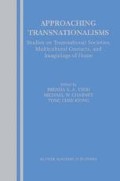Abstract
In the twenty-first century most, if not all, societies will be immigrant societies affected by the global flows of peoples, commodities, ideas and technologies, societies in which the nation becomes a “porous container of multiple criss-crossing, intersecting flows of different peoples and cultures” (Ang, 2000: 128). Globalization has begun to contest notions of ‘nation,’ ‘national identity,’ and ‘common culture’ and it has already provoked responses in the form of resurgent nationalisms, culturalisms, and tribalisms. At the beginning of the twenty-first century along with globalization we are witnessing a return to ethnic tribalism and new forms of cultural chauvinism. Appadurai (1998) warns us of the dead certainty of ethnic violence, and we have recently been reminded of this by the events in the small Pacific nation of Fiji. In “networked societies” (Castells, 1998) it is not only nation-states that become unbound and deterritorized (Basch, 1994) but unbound deterritorized cultures are also being created. The cell-phone, the Internet, and satellite and cable television have made instant connectivity a reality: family and friends are within instant reach, ‘home’ no longer needs to be ‘imagined.’ one’s preferred culture can be enjoyed and participated in across cyberspace and on personal computer screens. The opening ceremony of the Sydney Olympics could be enjoyed instantaneously by millions of viewers around the globe and one of my enduring images of that ceremony was of the number of athletes marching into the stadium while speaking on their cell phones to friends and family, or their managers or coaches, or their media sponsors, wherever they may have been around the world. The cell phone has already become an instrument to mobilize and manage political action and activism by diasporic citizens on behalf of homeland causes (see Panagakos, 1998). Web sites such as Huaren and the Hakka Global Network are examples of how the Internet is being used to reinvent or reassert ethnic identities and communities in cyberspace (see Lozada, 1998). Cable and satellite television and other media allow diasporic communities to maintain and sustain their cultural identities (see Cunningham and Sinclair, 2000). This technologically mediated bonding of diasporas may mean there is now less need for the kind of social bonding with the host community that Wang Gungwu (2000) suggested in his keynote lecture at the Singapore conference, and that immigrant societies will increasingly have to recognize and manage cultural diversity.
Access this chapter
Tax calculation will be finalised at checkout
Purchases are for personal use only
Preview
Unable to display preview. Download preview PDF.
Author information
Authors and Affiliations
Editor information
Editors and Affiliations
Rights and permissions
Copyright information
© 2003 Springer Science+Business Media New York
About this chapter
Cite this chapter
Min-hsi Chan, H.D. (2003). Recognizing Cultural Diversity and Renegotiating Civic Citizenship. In: Yeoh, B.S.A., Charney, M.W., Kiong, T.C. (eds) Approaching Transnationalisms. Springer, Boston, MA. https://doi.org/10.1007/978-1-4419-9220-8_6
Download citation
DOI: https://doi.org/10.1007/978-1-4419-9220-8_6
Publisher Name: Springer, Boston, MA
Print ISBN: 978-1-4613-4844-3
Online ISBN: 978-1-4419-9220-8
eBook Packages: Springer Book Archive

